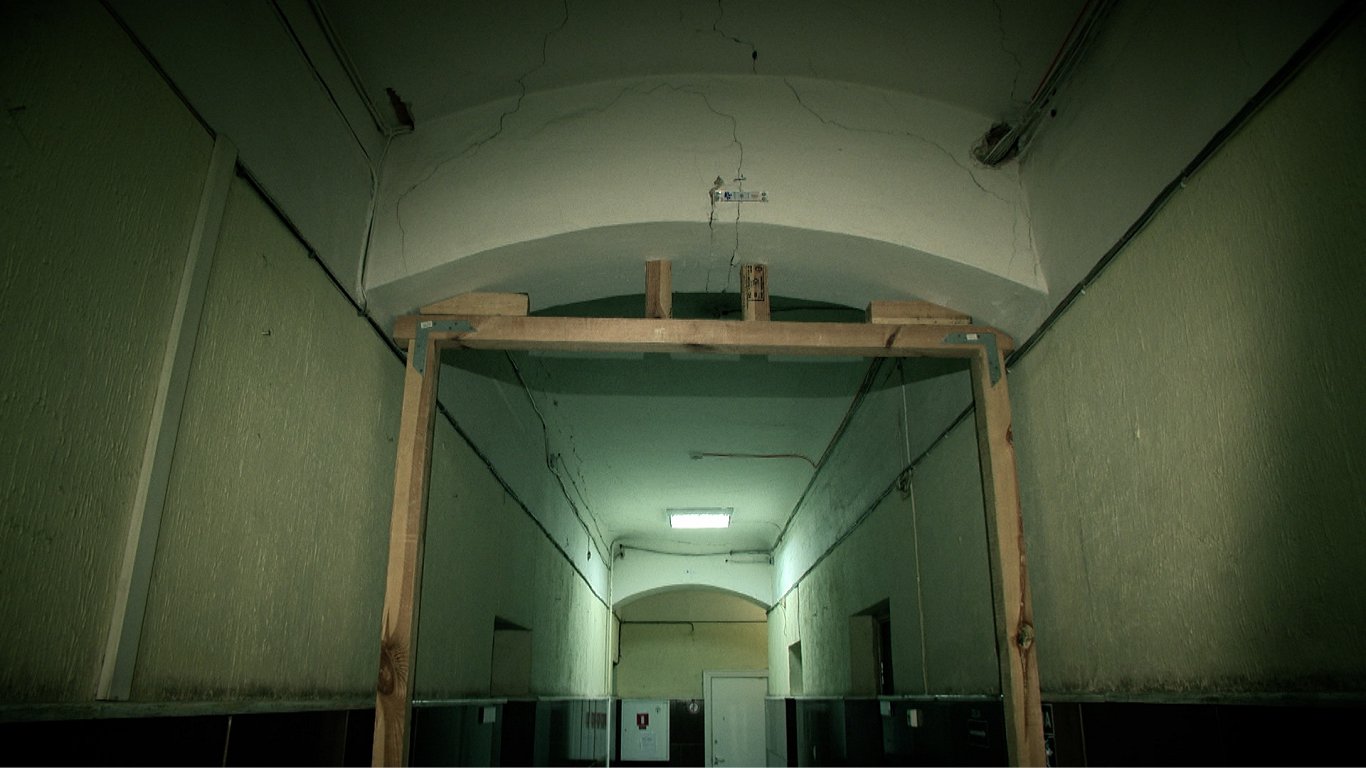The appearance of Latvian police stations can shock victims even more than a theft, in the words of one visitor of the station, “you can’t understand where you got to – the police or prison”. Peeled walls with holes, worn floors, holes in the floor and walls, wiring from the Soviet times – such a sad view was revealed by the program “Forbidden Technique” when visiting three police stations. The Ministry of the Interior is aware of the problem, but next year’s budget does not provide money for investments in police premises.
Police station in Riga, Matisa street
Aleksandrs Petrovs, the head of the Riga Center section of the Riga Regional Office of the State Police, agreed to show this section on Matīsa Street. He said the building was built in the early 19th century and had not been really renovated for years.
He has been working in the station since 2013, and old wallpapers “have been standing there for maybe 20 years, some holes have been tried to be sealed here, well, new holes appear from time to time”.
There is also new computer equipment in the section, but all distribution cabinets are of the old model, from the Soviet times.
“I’m not an electrician, but from time to time we have problems with electricity. Electricity is lost. Then there is no light. There is no electricity, ”said Petrov.
On the second floor, there are even safety supports installed in the hallway so that nothing falls from the ceiling. There are also indicators to monitor its cracks.
There are about 10 offices in the place where the employees of the criminal police department work, there are no windows in the hallway, there is no ventilation, there are chairs in the hallway where clients are waiting for their queue at the inspector.
Police station in Riga, Gogoļa Street
Oleg Losbergs, Deputy Head of the Order Police Department of the Riga Latgale District of the State Police, admits that he does not know how many years his unit has not been repaired, the on-call part was repaired seven years ago, but “nobody has done anything here since the collapse of the Soviet Union”.
The old windows are terrible, there is drafts in the winter, the employee, “sitting with his back to the window, works one day, then takes a sheet of incapacity for work, people are already getting used to it, pulls some sweaters,” said Losbergs.
And at the same time, police officers are forced to be repairers of the premises – they buy materials themselves, fight mold. There is a hole in the floor of the office on the second floor, but it was lucky that the old house has a double floor, otherwise you could see the first floor through this hole.
Workers try to patch holes in the walls on their own and with the means at hand.
District in Sigulda
The State Police station in Sigulda was insulated a couple of years ago for European money, the windows were replaced and now the premises also have radiators that can regulate the heat. At the expense of another project, the on-call part was also repaired a couple of years ago, but then everything ends.
Guntis Babāns, the head of the Criminal Police Division of the Sigulda District of the State Police, showed the premises where investigators and operatives work, where one of the offices has not had electricity for several days.
In order to improve the working environment in some way, the employees themselves repair and spend their funds.
Ilona Šteina, an inspector of the Order Police Department of Sigulda District, said that the employees “make those repairs because they feel bad in such premises. It did not satisfy them, so even though they felt better, they were ready to make the repairs for their own money ”.
The work environment affects work results
But a Dutch study found that working conditions have a very significant impact on the quality of work. In the Dutch town of Venlo, 70% of municipal employees moved to a modern green and fresh house, while 30% remained in their previous jobs. A two-year study found that green house workers are getting healthier, less sick, and the money saved on sick leaves almost outweighs all building costs.
But the architect and anthropologist Matiss Steinert told the show that space is also a form of communication that is equally important.
“The state authorities do not try too hard to do that, at least in Latvia, and then the question arises what message the state conveys to its citizens and what message they convey to their police officers,” said Steinerts.
“I have an example from the Latvian National Library, I know a librarian whose back was physically straightened when he was transferred to work in the new building of the National Library. The self-awareness that employees no longer go to work on some kind of room, but on the Palace of Light, was already reflected in the vocabulary of the people, and, as the librarians themselves say, it helped straighten the backs not only of those working at the National Library, but the librarianship industry as a whole. therefore, the quality of a good environment in building self-confidence cannot be underestimated, ”the architect explained.
No investments are planned from the budget; will be able to use the confiscated money
In order to make all police stations in Latvia modern, about 200 million euros are needed, and there is hope for the European Union money in the next seven-year cycle.
The Chief of the State Police, Armands Ruks, admitted that the premises must be modern, and the Minister of the Interior has also identified this problem and is actively participating. “The State Police and other institutions of the Ministry of the Interior, for example, currently have an agreed information report on the current situation and on the need to build new facilities of the Ministry of the Interior,” Ruks informed.
The Minister of the Interior Sandis Ģirģens (“KPV LV”) told the program that the ministry is working on standard depot projects, which in principle are already in a large, high stage of readiness. And I hope that the government will prioritize the development of these depot projects, where there are not only firefighters, but also an emergency medical service, police stations, border guards. And here, these European funds should be allocated as a priority to the home affairs sector. “
Armands Ruks informed that the construction of new objects was planned in 50 places.
However, no such investment plans are marked in next year’s state budget, which is currently being discussed in the Saeima.
Sandis Ģirģens informed that the only thing that has been achieved is that a provision has been entered in the budget that “if criminal funds over 2 million euros are confiscated, the Minister of Finance would have the obligation or right to decide on the redistribution of these funds and their transfer back to home affairs. department ”.
–


